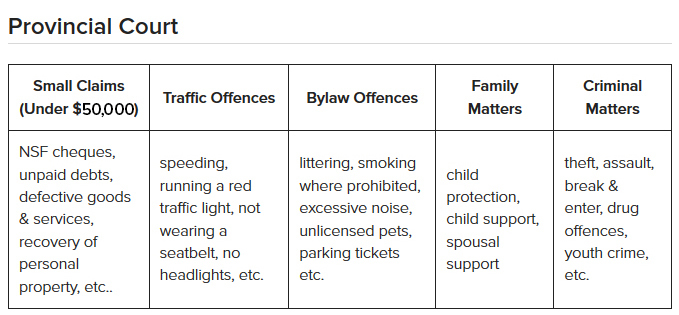There are three levels of courts in Saskatchewan. These are the Provincial Court, Court of King’s Bench, and Court of Appeal. Appeals can be made from a lower court to a higher court. Each province in Canada has similar levels of court. There are also some federal courts that deal with matters such as citizenship and income tax. Finally, there is the Supreme Court of Canada. This is the highest court level and it hears appeals from everywhere in Canada.
Provincial Court
The Provincial Court hears small claims matters and many criminal matters including offences by youth. All first appearances in criminal matters take place at the Provincial Court. The Province of Saskatchewan appoints Provincial Court judges. The Provincial Court has judicial centres across the province. These are places where a courthouse is located.
In some judicial centres, child protection matters and certain other family matters may go to Provincial Court. Normally, these go to the Family Law Division of the Court of King’s Bench. Some judicial centres have specialized courts, such as a drug treatment or domestic violence court.
Saskatchewan also has a Cree Court that travels to northern parts of the province such as Pelican Narrows and Sandy Bay. Court officials such as the judge, clerks and court workers speak Cree. Individuals may have access to Cree-speaking legal aid lawyers or Crown prosecutors. The Cree Court sits and presides over matters within its jurisdiction just as any other Provincial Court.
In addition, larger judicial centres have Traffic Safety Courts and Bylaw Courts. Justices of the Peace preside over these courts which deal with traffic or local bylaw offences.
Court of King’s Bench
The Court of King's Bench can hear both civil and criminal trials. It is also an appeal court for small claims and some criminal cases originally tried in Provincial Court. With some exceptions, family matters generally go to the Family Law Division of the Court of King’s Bench. Jury trials take place in the Court of King’s Bench. The Government of Canada appoints King’s Bench judges.
Court of Appeal
The Court of Appeal hears appeals from the Court of King’s Bench and some tribunals. It is also the appeal court for some of the criminal trials which take place in Provincial Court. The Government of Canada appoints Court of Appeal judges.
The reasons for an appeal from a lower court decision are limited. It is not enough to simply disagree with the decision. You must show that the judge misunderstood the facts or misapplied the law. Some legislation limits appeals to questions of law and jurisdiction. The mistake also must have significantly affected the outcome of the matter. For some matters, the Court of Appeal must grant leave before you can appeal.
Federal Courts
The Federal Court of Canada deals with matters such as civil cases involving the federal government. This includes matters dealing with patent, copyright and maritime law. There are also some specialized federal courts, such as the Tax Court of Canada. These courts only deal with a specific area of the law.
Appeals from any federal court are heard by the Federal Court of Appeal. They also hear applications for review from some federal tribunals or boards. This includes the Copyright Board and the Canadian Transportation Agency.
Supreme Court of Canada
The Supreme Court is the highest court in Canada. Its decisions are final and conclusive. It consists of eight judges and a Chief Justice. When a dispute involves Quebec civil law, at least two judges from Quebec must sit on the appeal.
The Supreme Court has jurisdiction over civil and criminal matters throughout Canada. It also decides all matters referred to it by the federal government, such as constitutional questions. In order to be heard in the Supreme Court, it must grant leave to appeal in most cases.
Leave is often granted when an important question of law is involved in civil cases and a significant sum of money is involved. In criminal cases, the appeal usually involves a serious offence. Whether the matter is of national importance is one consideration for granting leave. Under the Canadian Charter of Rights and Freedoms, the Supreme Court hears many constitutional cases.
All other courts must follow the decisions of this court unless the Supreme Court of Canada itself overrules a previous decision it made.


